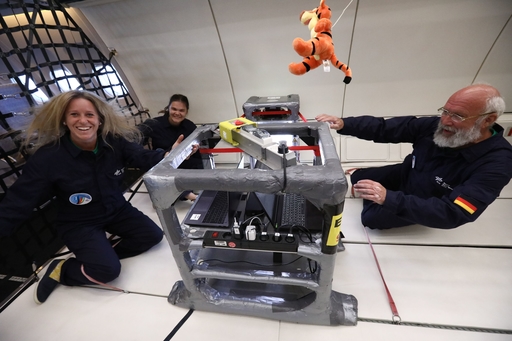The Group
The working group is a structure of cooperating scientists in which lectures and joint research activities are organized. The working group is established across different research institutions. It is headed by Prof. Dr. Ralf Stannarius (retired). The head of the group is assigned to the Department MTRM (Daniela Grimm) of the Faculty of Medicine.
The key research areas of the group are the investigation of the structure and dynamics of granular materials, the experimental investigation of thin liquid crystalline films, and self-organization in nonlinear systems. One focus of the investigations is on experiments under microgravity conditions on different platforms (ZARM drop tower Bremen, parabolic flights, experiments on suborbital rockets and on the International Space Station ISS). Another important focus is the use of artificial intelligence methods to evaluate scientific experiments and to predict the behavior of simple dynamical systems based on previous observations without complete knowledge of the underlying equations of motion..
Highlights of previous activities (Research in my-G)
The project OASIS (Observation and Analysis of Smectic Islands in Space) carried out together with the group of Noel Clark of University of Colorado in Boulder. Experiments at the International Space Station ISS.
Falcon 9 with the transporter Dragon (SpaceX) carrying the OASIS experiment to the ISS on April 14, 2015, 4:13 p.m.

http://www.nasa.gov/mission_pages/station/research/news/oasis/
The Experiment OASIS-TEx (Thermocapillary Experiments) in the framework of the TEXUS-Program of DLR on suborbital rockets (TEXUS 52 and TEXUS 55) in Kiruna, Northern Sweden.
Thermocapillary Experiments in Thin Liquid Crystal Films

TEXUS 52 in Esrange (Sweden) on April 27, 2015
The experiment EQUIPAGE on the New Shepard (Blue Origin) in van Horn (Texas)

Granular Gases under weak excitation and cooling of granular gases
Miission 9 of New Shepard in a Webcast (Blue Origin)
Parabolic flight campaign in the VipGran Project
Granular gases under strong excitation, clustering

73. ESA Parabolic flight campaign, October 26 - November 5, 2020, Paderborn
43. Parabolic Flight Campaign

Experiments with granular gases, new observation technique with intelligent internal sensors in the particles,
Projekt KORDYGA (K. Harth, TH Brandenburg), September 2024





